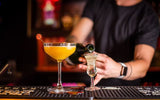
An In-Depth Look At Bartending Vs. Mixology


The short answer to this question is no, but it’s much more complex than you may think. Yes, both serve drinks. However, there’s more to mixology and bartending than many realize.
Although bartenders and mixologists have a lot in common, these careers have important differences. The skills required and the foundations of each job are different.

The dictionary definition of a bartender is “a person serving drinks at a bar.”
Bartenders are usually responsible for mixing drinks and serving customers. While some serve drinks to servers ordered by patrons, others interact with customers directly. Most bartenders have to do a mixture of both.
Bartenders may need to know how to make a few of the most popular cocktails, like Long Island Iced Teas, Manhattans, Margaritas, Mimosas, and Old Fashioneds. But this is not always a requirement.
Bartenders’ duties usually include:

Mixologists are described as “someone skilled at mixing cocktails and other drinks.” They have studied this craft, so they understand why each ingredient in a drink is included and what impact the mixing technique they’re using has.
Mixologists create brand-new drinks recipes, combining their own ideas with the knowledge they’ve learned. While they’re professionals that are comfortable working behind a bar and may even serve drinks directly to customers occasionally, much of their focus centers on the creation and design of new recipes backstage.
A mixologist’s duties include the following:

Bartenders and mixologists live by the quote, “according to chemistry, alcohol is a solution!”
On a more serious note, mixologists and bartenders create delicious drinks quickly and efficiently designed to please. They both need to have knowledge about how an ingredient will affect the final aroma and taste of a beverage.
These occupations require an essential understanding of the fundamentals of the hospitality industry and must keep up with constantly evolving developments. Mixologists and bartenders also need good communication skills as they engage with customers and fellow employees.
Their customer service knowledge is also important since they’re in the hospitality industry. The ability to read the room is also helpful in each occupation. Bartenders and mixologists should quickly be able to answer questions such as:
There’s also a need for creativity in both jobs. Bartenders and mixologists have to be able to think outside of the box. When creating and serving drinks, this trait will be necessary for dealing with those around them.
Unexpected, unique approaches and actions behind the bar are appreciated when accomplished well. Mixologists using novel ingredients will impress guests. Bartenders who can create personalized drinks for customers will turn an ordinary drinking experience into something more memorable.

More than you think!
The words “mixology” and “bartending” are inaccurately used these days interchangeably. While they have a lot in common, they’re certainly not the same thing.
Even when you consider the large overlap in their duties and prerequisites, each role is distinct.
For example, bartenders will spend most of their time at a cocktail bar creating classic cocktails that everyone knows and loves, along with serving traditional beverages like beer and wine. They’ll need to interact actively with customers in much the same way that restaurant servers do.
On the other hand, mixologists may only occasionally work in a bartending capacity. As the job title implies, much of their work is accomplished behind the scenes. That’s where they’re coming up with fresh cocktail ideas, creating new drinks menus, or adding their signature twist to crowd favorites.
It may help to think of mixology as the detailed study of inventing, designing, and preparing new drinks and cocktails. Mixologists can create elevated menus incorporating original techniques, fresh ingredients, and the kind of cocktails you won’t forget in a hurry.
Bartending is something you can study too. However, it’s a far more customer service-orientated profession. For bartenders, customer interaction is as important as preparing and serving drinks.
When it comes to bartending vs. mixology, it’s quite clear that there are major differences. While mixologists can be bartenders, bartenders are not automatically mixologists.
